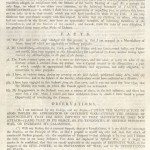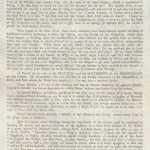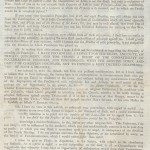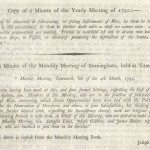Letter from Samuel Galton, jnr to The Friends of the Monthly Meeting in Birmingham
To the Friends of the Monthly Meeting at Birmingham:—
RESPECTED FRIENDS,
I have been visited on the part of your Monthly Meeting, by my worthy
Friends, Sampson Lloyd, Samuel Baker, and Joseph Gibbins; whose candid and liberal conduct to me, on this occasion, I acknowledge:—They left with my Father, a Copy of your Minute, dated 8th of the 4th Month, 1795, and a Narrative of Observations, that were made in the Yearly Meeting of 1795, on the subject of the Business, in which I am engaged:—And, I understand, that a Process is instituted, tending to the disownment of me, as a Member of your Society, in consequence of a Minute made at the Yearly Meeting of 1790; a Copy of which Minute, together with that of your Meeting, accompany this Address.
In this Process, adopted, reluctantly, I believe, on your parts (but to which I presume you conceive yourselves obliged, in compliance with the Minute of the Yearly Meeting of 1790) this is perhaps the only stage, in which I can claim your attention, to the following Statement of FACTS, and OBSERVATIONS;—or in which, I shall have an opportunity of requesting you, to preserve this letter, and to refer to it in that record, which you will have occasion to make in my Case. I am very solicitous that you should comply with this request, in order that my Children, or others, who may feel an interest in the Event, may have an opportunity hereafter, of informing themselves of the Circumstances, and of the Motives of my conduct; and because, from the rules of your discipline, I am precluded from every other Mode of Defence.
FACTS
1st. The sole, and entire cause alledged for this process, is, that I am engaged in a Manufactory of Arms, some of which are applicable to military purposes.
2nd. My Grandfather,—afterwards my Uncle;—then my Father and my Uncle,—and lastly, my Father and myself, have been engaged in this Manufactory for a period of 70 years, without having before received any Animadversions on the part of the Society.
3rd. The Trade devolved upon me, as if it were an Inheritance, and the whole, or nearly the whole of the Fortune which I received from my Father, was a Capital invested in the Manufactory; a part of which, consists in appropriated Mills, Erections, and Apparatus, not easily assignable, or convertible, to other purposes.
4th. I have, at various times, during my carrying on the said business, performed many Acts, with the Concurrence, and at the Instance of the Society, which alone would have constituted me a Member.
5th. I have been engaged in this business from the Year 1777, and it was not until the Year 1790, that the Minute was made, on which this Process against me is founded.
6th. My Engagements in the Business were not a matter of choice, in the first instance; and there has never been a time, when I would not have withdrawn from it, could I have found a proper Opportunity of transferring the Concern.
OBSERVATIONS
1st. I am convinced by my Feelings, and my Reason,—(*)THAT THE MANUFACTURE OF ARMS IMPLIES NO APPROBATON OF OFFENSIVE WAR—(||)THAT THE DEGREE OF RESPONSIBILITY THAT HAS BEEN IMPUTED TO THAT MANUFACTURE DOES NOT ATTACH—(_)AND THAT IN ITS OBJECT, OR ITS TENDENCIES, IT NEITHER PROMOTES WAR, OR INCREASES ITS CALAMITIES.
(*) Will any person, for a moment suppose, that as a Manufacturer, it is my object to encourage the Practice, or the Principle of War, or that I propose to myself any other end, than that which all commercial Persons propose, viz. the acquisition of Property?—And although it be true (and I lament the fact) that in too many Instances Fire Arms are employed in Offensive War, yet it ought in candor to be considered that they are equally applicable to the purposes of DEFENSIVE WAR, to the Support of the CIVIL POWER, to the PREVENTION OF WAR, and to the PRESERVATION OF PEACE.
(||)If Arguments from Abuse, are to be admitted against the Use, and the Existence of things, Objections may be made against almost every Institution, is susceptible of Abuse. Is the Farmer who sows Barley,—the Brewer who makes it into Beverage,—the Merchant who imports Rum, or the Distiller who makes Spirits;—are they responsible for the Intemperance, the Disease, the Vice, and Misery, which may ensue from their Abuse?—Upon this Principle, who would be innocent?
(_)No reflecting Person will contend that the Manufacture of Fire Arms has ever been the Cause, or Occasion of any War; it is a consequence only, but not a Cause:—Neither can it be admitted that the Calamities of War have been increased thereby,—all History, both sacred and profane, prove the reverse—Those horrid Contests, since the invention of Fire Arms, are universally allowed to have been less sanguinary, and less ferocious.
2d. I know that there are certain Texts in Scripture, from which some of our Society have drawn literal inferences, against all kind of Resistance: but do we not know that there are other Passages, and Texts of Scripture, which seem to admit of a different Construction. Some of these I shall take the liberty to mention, and refer the Comment, and the Inference to yourselves.
Does not St. Paul say that the Magistrate beareth not the Sword in vain? ROMANS xiii-4. Does not Jesus Christ speak in high terms of Approbation of the Centurion? (whose Profession was Arms). MATT. viii-10. Cornelius, the devout Christian, is not less distinguished. ACTS x. Does not Christ tell Pilate, that if his Kingdom were of this World, then would his Servants fight? JOHN xviii-36. In a Parable, does he not state to his Disciples, as an Example of Prudence, the case of a King going to War; whom he supposes first to consider, whether with an Army of 10,000 Men, he can go against his Opponent with 20,000? LUKE xiv.-31. In another Parable, he speaks of the Good Man of the house, watching for the Hour when the Thief would come, in order to resist him. MATTHEW xxiv.-43. Two of his Disciples wore Swords. LUKE xxii. 38. —and, in the same Chapter, Christ is represented as saying, “He that hath no Sword, let him sell his Garment and buy one .” The Apostle Peter is not reprimanded for wearing a Sword, but for using it improperly.—He was not told to cast away his Sword, but to put it up again into its place. MATT. xxiv-52. I must, however, in Candor allow that in the same Verse, it is said, “All they that take the Sword, shall perish with the Sword.” I hope, in stating these Quotations, not to be misunderstood, as attempting to wrest, or even to explain the Sense of the Scriptures on this head; much less to offer them as an Apology for Offensive War, for which I profess the most decided Abhorrence.
With regard to the other Texts, from which inferences have been deduced against all Kind of Resistance—without presuming to define the Nature, and the Extent of the Obligation, which these Texts impose, or deciding upon the Practicability of that Conduct (in the present State of Society) which you imagine them to enjoin—Permit me to enquire if any of you carry the literal interpretation into your own Practice. When smote on one Cheek, would you actually turn the other also? If you are sued at Law for your Coat, do you give your Cloak also? Do you uniformly give to those who ask, and from those who would borrow of you, do you never turn away? If an armed Assassin were to aim a Stroke at my Parent, my Wife, or my Child, ought I not to repel him with whatever Weapon were the most effectual? When your Houses are beset, and invaded by Thieves and Murderers, do you not call on the Civil Magistrate, and is he not obliged to use Arms against armed Ruffians; and to apply capital Punishment, to capital Offences? Do you hesitate to have recourse to the Coercion of the Laws to enforce your Rights, or to its Punishments, to vindicate your Wrongs.
3d. Permit me to refer to the PRACTICE, and the SENTIMENTS of our PREDECESSORS on this Subject. My Grandfather who was the first of my Family concerned in the Manufacture of Arms, and from whom the Trade is at length derived to me, was a convinced Quaker.
George Robinson, a Friend of this Meeting, and Son of Thomas Robinson, an approved Minister, long since deceased, was bound Apprentice to a Gun Maker, without any Censure from the Society.
In Sewell’s History, 2d Edition, published in the Year 1725, by the Assigns of J. Sowle, George Yard, Lombard Street. London, p. 235 & 236, it is related that R. Grassingham, a Quaker, of Harwich, who suffered Imprisonment with G. Fox, when he was about to be removed to London, by Warrant from the House of Commons, urges as a Plea with the Sheriff, that having received Orders from the Commissioners of the Admiralty, and Navy, to repair a King’s Frigate, he ought not to be taken from such Service;—this was about 1660.
Samuel Spavald, lately deceased, a Minister of high Esteem in Society, worked many Years in the King’sYard, at Chatham.
Isaac Pennington, whose Writings having the Imprimatur of the Society, must be considered as speaking the genuine and approved Doctrines of the Quakers, in a small Folio Edition of his Works, in 2 parts, printed by Benjamin Clark, George Yard, Lombard Lane, London, in 1681, p.323, in a Tract, intitled, “somewhat spoken to a Weighty Question,” says,—“I speak not this against any Magistrate, or People, defending themselves against foreign Invasions, or making use of the Sword to suppress the Violent, and Evil Doers, in their Borders; for this, the present state of things may, and doth require; and a great blessing will attend the Sword, when it is borne uprightly, to that end, and its Use will be honourable; and while there is need of a Sword, the Lord will not suffer that the Government, or those Governors, to want fitting Instruments under them, for the managing thereof, who wait on him in his fear, to have the Edge of it rightly directed. ”
4th. It is alledged that the Manufacturer of Arms, contributes to the carrying on War. But do you, not all in many ways contribute to the War, by supplying Government directly, or indirectly, with Money, which is so necessary, that it is called proverbially the Sinews of War? Do not such of you as are concerned in East India Stock, who subscribe to the Loan, who purchase Stock, Lottery Tickets, Navy Victualling, or Exchequer Bills, as directly, and as voluntarily furnish the means of War, as myself? Do not all those who voluntarily, and without being distrained upon, pay the Land Tax, and the Malt Tax, which are voted, and levied from Year to Year, expressly for the payment of the Army—or who pay any other Taxes levied for the purpose, or applied to the purposes of War, as directly violate the Principle you would enforce.
With respect to the Taxes, it may be objected that the Contribution is merely a Compliance with the Law, not spontaneous. But can any of you, my Friends, with Consistency, adduce this Plea, whilst you not only REFUSE A COMPLIANCE WITH THE LAW IN THE CASE OF TITHES, BUT ENJOIN THAT DISOBEDIENCE TO OTHERS, unless indeed you suppose the Mode of the moral, and religious Instruction of the Clergy, to be more criminal than War;—but even upon that Supposition and voluntary Payment of these Taxes, would be to sanction by your practice that violation of Principle, which the Law of the Society makes the Ground of spiritual Interdiction against me.
The Censure, and the Laws of the Society, against Slavery, and Oppression, are as strict and as decisive, as against War—Now, those who use the produce of the labor of Slaves, as Tobacco, Rum, Sugar, Rice, Indigo, and Cotton, are more intimately, and directly the Promoters of the Slave Trade, than the Vender of Arms is the Promoter of War;—because the Consumption of these Articles, is the very Ground and Cause of Slavery;—but the Manufacture of Arms is not the Cause, but only a consequence of War. Such of you as do not concede these Luxuries of Life to your Principles—Can you, consistently, require a Sacrifice from me, of a Concern in which my Property is so involved, and by which my Family would be so extensively injured?
If you carry your speculative Principles into strict, and rigid Practice, you will abstain not only from the Consumption of West India Commodities, but from all Commodities which are taxed, especially from Malt, and Wheat, and all the Produce of the Land; for, you may be well assured, that every Cup of Beer you drink, and every Morsel of Bread you eat, has furnished Resources for carrying on this War, which you so justly censure.
If you should be so conscientious as to abstain from all these enjoyments, I shall have no reason to complain of any partiality, in applying the same strict construction of principle against me. I shall greatly admire the efficacy of your opinions, whilst I lament that the Practice of your principles, is not compatible with the situation in which Providence has placed us.
5th. In making these observations, I hope I shall not be considered as suggesting the Propriety of extending the Penal Code. I HAVE TOO SINCERE A RESPECT FOR THE RIGHT, AND DUTY, OF PRIVATE JUDGEMENT, AND TOO STRONG A DOUBT OF THE COMPATIBILITY OF ECCLESIASTICAL CENSURE, AND PUNISHMENT, WITH THE GENUINE SPIRIT, AND OBJECT OF CHRISTIAN DISCIPLINE, NOT TO EXPRESS A MOST DECIDED DISAPPROBATION OF SUCH A MEASURE.
I am induced to make this remark, not from any personal considerations, but as I have reason to believe that in some instances, the Society have it in contemplation, to excommunicate those who pay Tithes (as you pay Taxes) in obedience to the Laws, and without feeling any conscientious Conviction of Impropriety of the Practice—I wish respectfully but most seriously, to avail myself of this, perhaps the only Opportunity in my power, to suggest to the solemn Consideration of the Society, whether Excommunication, (which is considered as a species of religious Persecution,) be consistent with that Discipline, which Christ proposed to introduce into his Church, whether it be really bearing a christian Testimony against paying Tithes—and if it be not a Violation of that Precept, meant to be inculcated by this Text—“Who art thou that judgest another Man’s Servant, to his own Master he standeth or falleth?” ROMANS xiv.-4
6th. I have no view in this address, to embarrass your proceedings, with regard to myself. An equitable attention to my own Case, seemed to require a fair statement of Facts, and a candid examination of Principles—My intention is to point out the injustice of the Law,—but not to appeal from it.—To prove that it is too strict for the Practice of the Society—too partial for its Principles.
I acknowledge a decided Preference, to this, before any other religious Sect. This Preference, I do not imagine will be influenced by the measures, which you may conscientiously conceive it to be your duty to pursue, or which you may think it incumbent upon you to adopt, in consequence of the direction of the Yearly Meeting. I do not perhaps entertain the same Opinions, as are entertained by many, on the subject of Excommunication, which I would rather suffer than inflict.
I mean to give no Pledge, or Expectation, to the Society, with respect to the abandoning my Business; but to reserve to myself, a perfect Independence on that head, to act as Circumstances may suggest—So that whenever I may have an Opportunity of withdrawing myself from these Engagements consistently with my Judgement, I shall have the satisfaction to feel that I act from spontaneous Sentiment only, and not from unworthy Influence.
Circumstanced as I am, standing in no new Relation to the Society, by any Act of my own,—I cannot with Propriety withdraw myself. I state the Sentiments, and Practice of our Predecessors; and if I should be disowned—I shall not think that I have abandoned the Society, but that the Society have withdrawn themselves from their antient, tolerant Spirit, and Practice. I have no doubt but that I shall equally retain the esteem of the more liberal, and enlightened amongst you, and I shall not cease to wish for the Happiness of the whole Society.
Saml Galton
Copy of a Minute of the Yearly Meeting of 1790:—
“If any be concerned in fabricating, or selling Instruments of War, let them be treated with in love; and if by this unreclaimed, let them be further dealt with as those we cannot own. And we intreat that when warlike preparations are making, Friends be watchful lest any be drawn into loans, arming, or letting out their Ships, or Vessels, or otherwise promoting the destruction of the human Species, 1790, written Epistle.”
Copy of a Minute of the Monthly Meeting of Birmingham, held in Tamworth:—
“Monthly Meeting, Tamworth, 8th of the 4th Month, 1795.
Mention having been made at this, and some former Sittings, respecting the Case of Samuel Galton and Samuel Galton, jnr. Members of this Meeting, who are in the practice of fabricating, and selling Instruments of War, concerning which divers Opportunities have been had with the Parties, by several Friends, under the Nomination of Overseers, and others, to some Satisfaction; but thinking it proper that they should be further labored with, respecting the Inconsistency thereof, with our religious principles: We appoint the following Friends to visit them, on behalf of this Meeting, who are desired to make a Report thereof, at a future Monthly Meeting, viz. Sampson Lloyd, Joseph Gibbins, and James Baker, together with any other Friends who are inclined to join them in the Service.”
The above is copied from the Monthly Meeting Book.
Joseph Gibbins.









